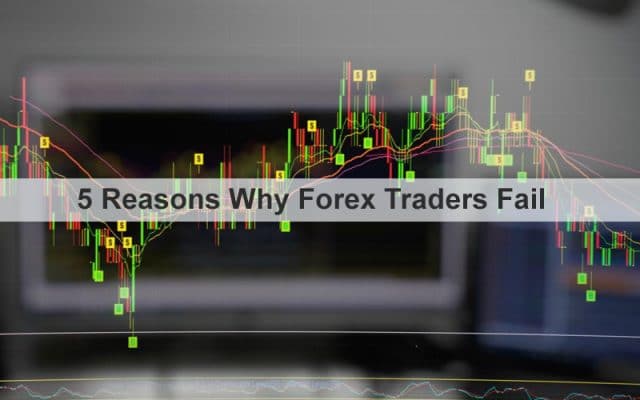With more than $5 trillion being traded every day, the forex market is the biggest financial market in the world. But, though there are numerous forex investors, only a few of them are successful. In fact, only 10-20% of forex traders are able to make a living off of trading, while the majority of forex traders lose money.
Trading in currency markets requires long, deliberate, and detailed planning on various levels. Traders need to have an understanding of the market and an awareness of its dynamics to commence trading. In this guide, we take a look at the five reasons why forex traders lose money.
1. Not Maintaining Trading Discipline
Whatever the experience level of the trader, maybe, the biggest mistake that s/he can make is to let emotions affect trading decisions. A successful trader may suffer many smaller losses, but that is covered up by a few big wins. Going through many consecutive losses can be hard to handle emotionally, and it can really be the litmus test of a trader’s confidence and patience.

When traders receive bad news about the economy or a certain stock, their natural response is fear. Many tend to overreact and feel pressure to liquidate their holdings or refrain from taking any further risks.
This way, they avoid certain losses, but they also lose out on potential profits. Traders need to understand what they are afraid of and why. When they learn to quantify their fears, they can perceive events instinctively and move past their emotional reactions.
A trader needs to be aware of his/her greed. Greed is often tied to the instinct to do better, to rein in those extra profits. But, traders that hang on to their winning positions for too long end up getting caught in the trend reversals.
A trader has to create rules that he can follow during times of psychological crunch. Guidelines based on risk-reward tolerance for entering and exiting the market and putting stop loss to take the emotions out of the game are a wise set of rules that a trader must obey.
2. Not having a Trading Plan
The adage “Failing to plan is planning to fail” is rightly suited to all types of trading. Regardless of whether you are trading forex or some other asset class, if you want to succeed in this business, you have to follow a trading plan.
Financial trading has to be seen as a form of business, and just like any proper business project, it too needs a plan. Having a poor attitude and failing to prepare for the market conditions will only lead to losses. To counter the uncertainties and vagaries of the market, any serious trader has to invest enough time and effort into developing a comprehensible trading strategy.
The minimum that a trading plan needs to have is the optimum entry and exit points, risk management rules, risk-reward ratios, and the expected return on investment. Sticking to a strategic trading plan will allow investors to circumvent many of the trading pitfalls. Without a plan, you, as a trader, are simply selling yourself short of what is possible to accomplish in the forex market.
3. Poor Risk and Money Management

Another primary reason why forex traders lose money quickly is improper risk and money management. It’s not for nothing that trading platforms have stop-loss and take-profit mechanisms. A trader who can master these will improve the chances of success significantly. Traders need to understand how to implement these mechanisms adequately based on the predicted market volatility and trade duration.
Successful traders are always aware of the risk that their invested capital is in but are nevertheless content knowing that it is appropriate to the potential profits. Capital preservation becomes especially important as the trading account gets larger. Traders who want to insulate themselves from catastrophic losses can diversify among different currency pairs and trading strategies coupled with proper position sizing.
Traders who are well versed in risk and money management will divide their accounts into separate risk-return parts. Thus, they can dedicate a small portion of their account for high-risk trading, while using the rest of the balance with caution and conservatism. Such a strategy ensures that unprecedented events and broken trades do not jeopardize the trading account.
4. Failing to adapt to the market conditions
Markets are not static, and traders that assume that a single trading strategy is going to be enough to generate winning traders are going to lose money. Because markets are constantly changing, traders have to develop the skill to track down the changes and adapt to the market conditions.
The good part is that the market changes do not only bring about new risks but also many opportunities as well. A successful trader doesn’t fear change but values it. There are many things that traders need to familiarize themselves with, the least of which include the following:
- Tracking volatility
- Following new developments and news releases
- Determining whether a market is trending or ranging.
Trading performance depends on market volatility. Market volatility can spread across a few hours to years. Some of the trading strategies depend on volatility, while others do not perform that well in unpredictable times. Therefore, a trader must use a strategy that is consistent with market conditions.
Keeping track of financial new releases is vital for traders. Market sentiment can shift with monetary policy decisions (like changes in interest rates) and economic data (unemployment, consumer confidence, etc.). When the market reacts to such events, there occurs an inevitable impact on the currencies’ supply and demand.
Lastly, traders who cannot differentiate ranging markets from trending markets end up using the incorrect trading tools that often lead to catastrophic losses.
5. Having unrealistic expectations
Forex traders can be grouped into two categories. First are those who have had experiences in the stock market and other financial markets and move to forex looking to diversify their investments and search for better trading conditions. The second group comprises of novice traders that have never had the experience of trading in financial markets. It is only logical to assume that the first group of traders tends to be much more successful because of their experience.
These traders are aware of the reasons why novice traders generally fail at forex markets. Their experience prescribes them to keep realistic expectations with regards to profit. Such a mindset allows them to evade the pitfalls of trading, such as chasing prices or bending the rules – two strategies that are seldom beneficial. Having expectations grounded in reality also helps such traders rein in the psychological stress and keeps them level headed even if they lose a few trades.
Novice traders should remember that forex trading is not a way for them to get rich overnight. It is like any professional career that has its good days and bad days, wins, and losses. If a trader can limit market exposure for every trade, s/he can attain a peace of mind knowing that a few small trade losses will not impact their long-term performance.
For a trader of any type, patience and consistency are the two pillars of success. Do not look to make a small fortune with a few big trades. Such a strategy will only reinforce bad habits and may push you significant losses over time. Instead, look to get positive compound results with smaller traders over a long period, such as a few months or years.

In Summary
These are the five main causes of forex traders losing money and failing in their trade. There are many steps that traders can take to prevent such losses from taking place. Some of these include studying and researching the markets, coming up with comprehensive trading plans, managing risk, and capital and keeping emotions out of the equation. It is the surest way of achieving consistent success over time and improving your trades significantly.
The forex market is ruthless and super competitive, and psychologically can be tough on many traders. It is essential for you, as a trader, to be aware of your weaknesses and work on them as you will be going through many ups and downs in this market. Even though statistics highlight that most traders lose money in the forex market, it doesn’t mean that you have to suffer as well. As long as you have covered your bases, worked on a trading strategy, and are adaptable in managing risks, forex trading should be a successful endeavor for you.




